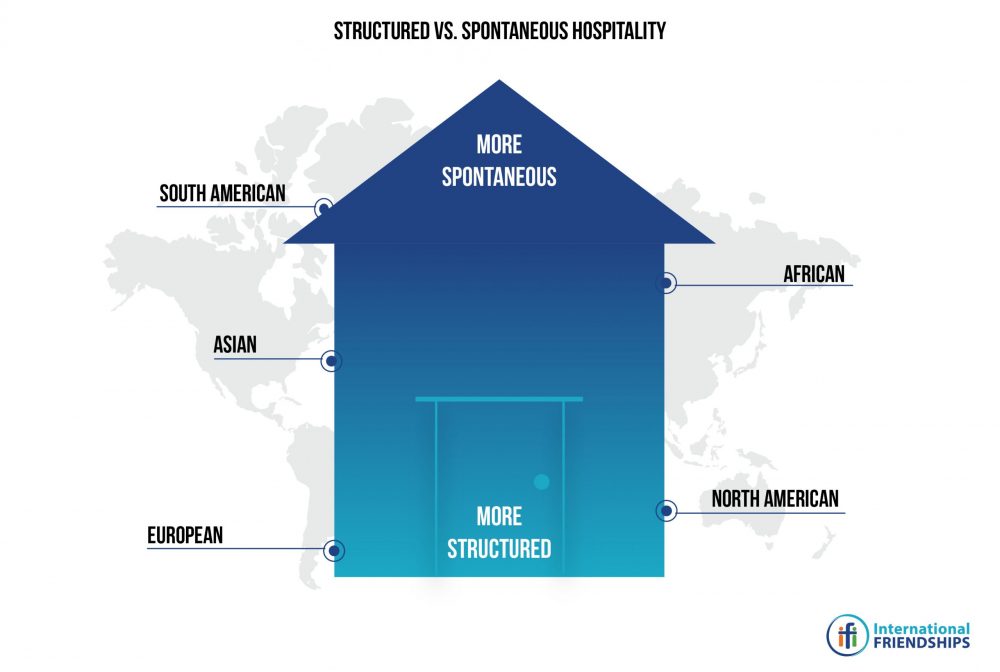Based on Sarah A. Lanier’s book Foreign to Familiar, McDougal Publishing: 2000.
“One of the shocks a foreigner encounters the moment he arrives in some direct countries is that he needs money to survive…Many travelers from indirect countries, if they happen to be limited in funds, have saved, sacrificed, and received gifts from family and friends to purchase their airplane tickets. Once they are on the plane, they assume that they are now guests. When their food is provided on the plane, this reinforces their feeling that they will be cared for by their hosts. Little do they realize that many [North] American families have never even considered this as their responsibility.”
~Foreign to Familiar by Sarah A. Lanier
In ancient cultures, hospitality involved welcoming a stranger and offering them food, shelter, and safety. This is still true in some cultures today, but in others, the meaning of hospitality has evolved to mean something a little different. In direct cultures, such as the United States, hospitality is rarely about offering protection and survival and is often associated with etiquette and entertainment instead. Direct cultures are known to plan their hospitality out, sometimes to the tiniest of details. Although they still make a point of showing respect and care for their guests, they tend to do so only to a point that was planned for. In contrast, indirect cultures make a habit of extending their hospitality beyond what can be planned for to the point that their hospitality is often called “spontaneous.”
 Foreign to Familiar, by Sarah A. Lanier, describes the sometimes drastic differences between direct and indirect cultures. (You may recall distinctions between indirect and direct cultures from another article IFI published recently called 3 Characteristics of an Indirect Communicator). In the case of hospitality, Sarah shows how indirect cultures mainly practice spontaneous hospitality, and direct cultures mainly practice planned hospitality. Becoming educated on the differences in hospitality from culture to culture is especially important when hosting internationals, or when you find yourself in an international environment, so that all parties can understand and communicate in a way that is harmonious.
Foreign to Familiar, by Sarah A. Lanier, describes the sometimes drastic differences between direct and indirect cultures. (You may recall distinctions between indirect and direct cultures from another article IFI published recently called 3 Characteristics of an Indirect Communicator). In the case of hospitality, Sarah shows how indirect cultures mainly practice spontaneous hospitality, and direct cultures mainly practice planned hospitality. Becoming educated on the differences in hospitality from culture to culture is especially important when hosting internationals, or when you find yourself in an international environment, so that all parties can understand and communicate in a way that is harmonious.
Planned Vs Spontaneous Hosting
In the United States, much cleaning and preparing usually occur before hosting guests in the home. Often in a direct culture, hosting in the home is seen as somewhat of a formal event and one which is taken seriously and planned for. Hospitality is a special occasion for direct cultures, taking the host’s full attention to ensure that their guests are entertained and well cared for. For an indirect culture, hospitality is more spontaneous and largely unplanned. Read the excerpt from Foreign to Familiar below in which Sarah learns a lesson about planned vs spontaneous hospitality:
 When I first went to Chile, I was looking forward to the hospitality and assumed that I would be invited into the homes of the people. The first month I was there, however, although I was in a small community and people knew I was there, nothing happened. I was crushed by this… I voiced my disappointment to Ricardo, my mentor. He laughed and said, “Sarah, they are offended that you have not come by. You stay to yourself at night like you don’t want relationship. We don’t send out invitations around here. You just come by.”
When I first went to Chile, I was looking forward to the hospitality and assumed that I would be invited into the homes of the people. The first month I was there, however, although I was in a small community and people knew I was there, nothing happened. I was crushed by this… I voiced my disappointment to Ricardo, my mentor. He laughed and said, “Sarah, they are offended that you have not come by. You stay to yourself at night like you don’t want relationship. We don’t send out invitations around here. You just come by.”
“But how can I ‘come by’ when I don’t even know these people?” I asked.
“That’s just the way it’s done,” he said. “Only formal occasions require invitations. The rest is spontaneous.” (Pg 72-73)
Sarah was used to the hospitality of a direct culture where typically an invitation is extended to come over on a certain day, usually a day or even weeks in advance. What Sarah didn’t understand about the new, indirect culture she lived in was that hospitality was spontaneous there, with no advance warning or invitation before showing up. They didn’t need to prepare for her arrival, they just wanted to spend time with her and create a relationship.
Privacy Vs Inclusion
One reason why hospitality is so vastly different between indirect and direct cultures could have to do with their perspectives on privacy and inclusion. Take a look at the rest of Sarah’s conversation from earlier with her mentor about spontaneous hospitality:
“But what if people are busy or want to be left alone? How would I know when to come over?” I insisted.
“Sarah,” he told me, “you just don’t get it. Coming over will never interrupt them. They will continue cooking, playing with the kids, or watering the garden. You will just fit into whatever is going on at the moment. They won’t drop everything to sit in a formal living room with you. In our culture, people come first, and our own desires come last. We would never forfeit hospitality for time alone.” (Pg 73)
 People in indirect cultures have little concept of privacy and prefer to automatically include everyone in everything including meals, plans, conversations, and so on. It is not desirable to be left alone and it’s rude to exclude others. Their motto is “we all take care of each other and no one stands alone.”
People in indirect cultures have little concept of privacy and prefer to automatically include everyone in everything including meals, plans, conversations, and so on. It is not desirable to be left alone and it’s rude to exclude others. Their motto is “we all take care of each other and no one stands alone.”
When Sarah returned to a direct culture, where hospitality was planned in advance, she had to once again relearn how people in a direct culture planned and spent their time if she wanted to spend time with friends:
As a [direct] person in Chile, my greatest sacrifice was giving up my time to myself. I never knew when I would be interrupted. It seemed exhausting until I got used to it. Then it became second nature to me. Soon after returning to Amsterdam from Chile, one Sunday afternoon I cooked up some food, which I often do for recreation. I then proceeded to call around to friends to invite them over that evening to eat. Call after call was met with disappointment. No one could come. I would get the response of: “I would ordinarily have loved to come, but I was planning to just relax tonight,” or “Oh, if I’d only known earlier, but I’ve taken a bath now and don’t want to go back out. How about if we do lunch on Tuesday?” Well, I wasn’t lonely at lunchtime on Tuesday; I was lonely on Sunday night. Yet because of the need they had to have planned to come, I was not able to convince a single friend to come over. That’s when I realized a reason for loneliness in our well-organized city. What we needed was some [indirect culture] spontaneous relationship and a little less [direct culture] structured privacy. (Pg 62)
Direct cultures are known to value their privacy. This includes their possessions, conversations, and especially their time. People in direct cultures enjoy having time and space to themselves, planning it into their schedules. This is why an invitation is needed before visiting within a direct culture. Visit Two Sides of Time: Task-oriented Cultures vs Event-oriented Cultures to read more about how different cultures view time.
Other Differences between Structured and Spontaneous Hosts
By the time that most new travelers learn about the differences in cultural hospitality, it is often too late to avoid misunderstandings or even mistakes caused by the differences. People from spontaneous cultures are often used to the host fully taking care of the guest’s needs, with the guest paying nothing to them except maybe a gift in thanks for their hospitality. When showing up unexpectedly in search of hospitality, “a place on the floor would be fine… the important thing for them is to be able to stay with people they know or can trust (Pg 74).” Travelers are taken in and provided for in whatever way the host is capable of doing- whether that’s a place on the floor to sleep or even just a simple meal.
 In the United States or other more structured cultures, travelers are expected to be responsible for their own arrangements. This means that the guest has either already cleared their desire to stay with the host, or has made other arrangements at a hotel. Guests in a direct culture would also need to expect to pay for their own transportation, food, and entertainment with exception of when the host clearly says, “I’ll pay,” or, “my treat” when extending the invitation. Often when visiting the United States, internationals will learn the painful (and humiliating) way that North Americans assume that everyone will pay for themselves. “If a foreign guest is part of an outing to the beach, his friends may suggest going off for ice cream… The humiliation he feels when standing there with the ice cream, and his friends walking off with theirs, is excruciating. He doesn’t have money with him (Pg 76).”
In the United States or other more structured cultures, travelers are expected to be responsible for their own arrangements. This means that the guest has either already cleared their desire to stay with the host, or has made other arrangements at a hotel. Guests in a direct culture would also need to expect to pay for their own transportation, food, and entertainment with exception of when the host clearly says, “I’ll pay,” or, “my treat” when extending the invitation. Often when visiting the United States, internationals will learn the painful (and humiliating) way that North Americans assume that everyone will pay for themselves. “If a foreign guest is part of an outing to the beach, his friends may suggest going off for ice cream… The humiliation he feels when standing there with the ice cream, and his friends walking off with theirs, is excruciating. He doesn’t have money with him (Pg 76).”
Related to business, a more direct or structured culture would prefer to host a potential business client or partner at a nice restaurant instead of in their homes. Direct cultures often prefer to keep a separation between their work relationships and their personal relationships. This is not so in an indirect, spontaneous culture. It would be seen as not being personal enough and not good hospitality to host anyone at a restaurant instead of in their homes in an indirect culture. Business clients and partners are invited into the homes in indirect cultures to create a place of relationship out of which they can then do business.
Conclusion
Hospitality is the basis of relationships in any culture. Direct cultures try to plan and create a “perfect” atmosphere for their guests to entertain them and provide for their needs. Indirect cultures, on the other hand, provide a different kind of “perfect” hospitality, one which is pure and unplanned. Traveling between cultures that use the opposite types of hospitality can cause many misunderstandings and hardships, and even hinder relationships if you do not understand the type of hospitality that the culture is accustomed to using. Before traveling to another culture, be sure to learn and understand what type of hospitality the people there use in order to most effectively succeed in creating relationships. The same can be said for when you are hosting an international or befriending someone from another culture. Always do your best to learn the customs of others so that you both will be able to effectively communicate and create a relationship built on understanding instead of misunderstandings. In either case, both the spontaneous, indirect culture and the planned, direct culture would do well to learn from each other, balancing spontaneity with plans, and plans with spontaneous hospitality.



